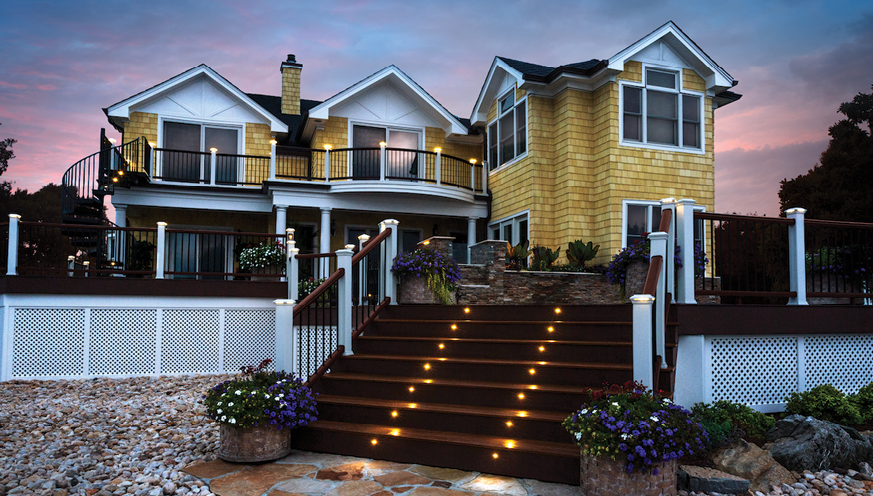- Home
- Media Kit
- Current Issue
- Past Issues
- Ad Specs-Submission
- Ad Print Settings
- Reprints (PDF)
- Photo Specifications (PDF)
- Contact Us

![]()
ONLINE

Relationship-Driven
Editors’ Note
James Cline served as the Chief Financial Officer of Trex from March 2008 to August 2015 and as its Senior Vice President and CFO from August 2013 to August 2015. Prior to Trex, Cline served as President of Harsco GasServ, a subsidiary of Harsco Corporation. He served in various capacities with Huffy Corporation from June 1976 to February 1994, including as the Director of Finance of its True Temper Hardware subsidiary, a manufacturer of lawn care and construction products with nine manufacturing locations in the United States, Canada and Ireland. He has been a Director of Trex since August 2015. Cline received his undergraduate degree in accounting from Bowling Green State University.
Company Brief
Since the late 1980s, Trex (trex.com) has invented, defined and perfected the composite deck category, becoming the world’s largest manufacturer of wood-alternative decking products. Formed in 1996 through the buyout of a division of Mobil Corporation, the company went public in 1999. Today, it offers the industry’s widest array of high-performance composite products which are available in more than 40 countries around the world.
What has been the key to Trex’s growth?
It’s the relationship with the consumer, as well as the retailers. We have a two-step model and about 25 to 30 percent of the business goes direct through major retailers such as Home Depot and Lowe’s, and the other 70 to 75 percent goes to distributors, then to professional lumber yards for sale to builders and consumers. It is the relationships with both them as well as the consumer that are critical. We also have a group of independent professionals that installs the product. We call them Trexpros and those relationships drive a lot of the business that is professionally installed, as opposed to individually installed. Our business is more relationship-driven than it has ever been.

Samples of the use of Trex products in outdoor designs
Where do you see the greatest opportunities for Trex’s future growth?
Over the next ten years, it will primarily be organic growth. We have a huge opportunity to convert about 80 percent of the market which is currently wood. A large percentage of that market is convertible. I think the number is roughly 60 percent that we believe we can convert over time.
How do you define the Trex culture?
I think the engagement of the employees is what’s critical beyond anything else, and once our employees stay with us past one year, they’re essentially with us for their career. We have a great relationship because we empower the employees and they are tremendously engaged. The introduction of our major products would not be possible without the engagement of people from those at the top through those on the factory floor. They make it successful and identify ways to help streamline the processes even if it isn’t their job because it is important to them that the company be successful.
What is the Trex advantage?
The Trex advantage comes from our ability to understand what’s important to our customers and then fulfilling those needs. Our customers need to have people buy deck boards from them. We supply them a way to expand their business, whether it be through installers where we pass leads to them who then buy from retail establishments, or by introducing a new product category such as our enhanced outdoor fire and water collection which opens up a new market for them that they didn’t participate in before. We also excel at making it easy for them. Purchasing a deck can sometimes be daunting and we have put systems in place inside the company such as a call center to make it easier to get help when they’re going down that decision path. We can help them with issues such as how to find a contractor, what they should be considering with different materials, where they can purchase the materials, and how they get a sample. They can find all of this online, but if they would rather pick up the phone or go to a retailer where we have that information, we try to make it as easy as possible in what can often be a stressful event of doing a major home improvement project.

Is price a differentiator for Trex?
It is when you have, for example, a wood-buyer in North America who would normally buy pressure-treated lumber. Even if we were two times the cost of pressure-treated, we would still be a value because of the advantages of wood-alternative decking. In Europe, we’re really competing against maybe 50 to 60 domestic manufacturers and a plethora of Chinese manufacturers. There, it’s about quality first, as well as the brand. Price is important, but the quality and the brand is carrying the products through.
Will you discuss the strength and expertise of Trex’s management team?
We have been fortunate with our management team. One of the things I’ve done since I took this job back in 2015 was to involve all of the vice presidents in analyst meetings which hadn’t been done in the past. Each of the vice presidents gets exposure, and that’s important because we have a number of analysts following us and we have time constraints, so we’re able to spread access through our vice presidents. We’re able to divide and conquer.
The fortunate thing for us is that we don’t need to worry about what one person is going to say. Everybody is speaking about what we talked about in the last earnings call. They can give a different take because of their different backgrounds, one might be from marketing and another from sales, but the same consistent story exists.

How critical has it been for Trex to build a diverse and inclusive workforce?
We’re selling a construction product and you would think that our salesforce would be mainly male. Do we really want women out in the field selling that product? The answer is yes, and we have found that they are really good at it. We have a very good female-to-male ratio in all of our sales-related positions. Part of that was achieved by opening the door with a program we have with the major retailers to make sure their shelves are stocked right and that they are training their people. This process was dominated by females. We found that they were successful and they were able to move into the normal trade-side of the business. We increased our numbers quite dramatically as positions opened and we were able to move them through the organization.
Our board is now about 25-percent female. Getting that perspective is important for a number of reasons. One of the most important reasons relates to who makes a decision on decking. At the end of the day, it’s the woman. Getting different perspectives adds value and helps us all look at things differently. That broad perspective is important for any business.
How important has it been for Trex to be engaged in the communities it serves?
I think the company sets the tone, but at the end of the day I think you find that the employees drive the relationship with the community. Trex is not the largest manufacturer or largest employer in the Winchester, Virginia area. However, we are the largest donor to the United Way and it’s not just the company donating - it’s all the employees. They contribute because they want to give back to the community. They know people who have needed help, and they’ve seen what the United Way can do to help those in need.
We’ve just undertaken another cause called Yellow Ribbon. It provides support for wounded veterans and their families to help them with expenses as they go through the recovery process. This helps keep the family unit together as they go through this difficult time. Right now this is mainly a corporate contribution but, over time, our employees will also be contributors to this. We see this as an important opportunity to help the community and help those people returning from war with very devastating injuries.
How would you characterize your leadership style?
I have been very hands-on during my career. I’ve done a number of turnarounds, and those don’t happen with a ready, aim, shoot mentality. It’s usually shoot, or ready, shoot. I’ve done well in this environment, but I like to think that when I became CEO, my goal was to develop the next team of managers who have the opportunity to step into my role.
I think the company works best when I don’t have to make every decision. When our leaders come together as a team and work through any issues, questions, or problems we are encountering, they are going to come up with a much better answer than one individual saying we’re going to do it this way. That collaborative approach has been very successful and I think it’s one of the reasons we’ve done so well.![]()